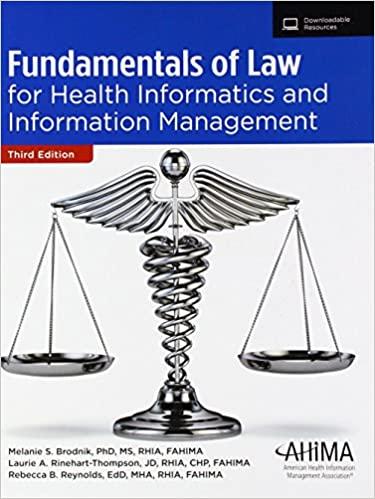Question
all relevant information is provided use the references below to answer the following questions *187 Jack Wilson, Assistant Attorney General of Tennessee, reargued the cause
all relevant information is provided
use the references below to answer the following questions
*187Jack Wilson,Assistant Attorney General of Tennessee, reargued the cause for appellees. With him on the briefs wereGeorge F. McCanless,Attorney General, andMilton P. RiceandJames M. Glasgow,Assistant Attorneys General.
Solicitor General Cox,by special leave of Court, 365 U. S. 864, reargued the cause for the United States, asamicus curiae,urging reversal. With him on the briefs wereAssistant Attorney General Marshall, Acting Assistant Attorney General Doar, Bruce J. Terris, Harold H. Greene, David
RubinandHoward A. Glickstein.
additional question
19copies1
Question 1
I would like to know the exact mechanism of entry of potassium into
cells under the influence of insulin.
Question 2
I am seeing an increasing number of diabetic patients in primary care
who have elevated fasting blood glucose readings but postprandial
measurements that are normal or only slightly high. Does this indicate
insulin resistance in these patients? What is the reason for this trend?
Question 3
What are the latest diagnostic criteria for the diagnosis of diabetes
mellitus?
Question 4
What test is recommended for diabetes and can the same be used to
diagnose diabetes in a child?
Question 5
What is the value of glycosylated haemoglobin (HbA1C) in diabetes
mellitus?
Question 6
I read in a book that in diabetics the random blood sugar is more
important than the fasting; on a medical website I noted that, for a
patient with type 2 diabetes, the fasting blood sugar level is more
important. What do you say?
Is it acceptable to let the fasting blood sugar remain at approximately
1.5 mmol/L above the upper limit in a patient of60 years with type 2
and presently on oral therapy?
Question 7
In type 2 diabetes, which blood sugar - fasting or random - is more
revealing prognostically?
Question 8
Why are the fasting and 2-hour blood glucose levels needed in a diabetic
patient being treated with oral antidiabetic drugs?
Question 9
Is it sufficient to use a fasting blood sugar and glycosylated haemoglobin
(HbA1C) level as a guide to modify the insulin or oral antidiabetic dose
without considering the 1 and 2 hour postprandial values?
Question 10
What is the value of the 2-hour postprandial blood sugar level above
which the dose of an oral antidiabetic should be increased if this value is
exceeded several times despite dietary modification?
Briefs ofamici curiae,in support of appellants, were filed byJ. Howard Edmondson,Governor of Oklahoma, andNorman E. Reynolds, Jr.for the Governor;W. Scott Miller, Jr.andGeorge J. Longfor the City of St. Matthews, Kentucky;Roger Arnebergh, Henry P. Kucera, J. Elliott Drinard, Barnett I. Shur, Alexander G. Brown, Nathaniel H. GoldstickandCharles S. Rhynefor the National Institute of Municipal Law Officers;Eugene H. NickersonandDavid M. Levitanfor John F. English et al.;Upton Sisson, Clare S. Hornsby, Walter L. Nixon, Jr.andJohn Sekulfor Marvin Fortner et al.; andTheodore Sachsfor August Scholle.
Step by Step Solution
There are 3 Steps involved in it
Step: 1

Get Instant Access to Expert-Tailored Solutions
See step-by-step solutions with expert insights and AI powered tools for academic success
Step: 2

Step: 3

Ace Your Homework with AI
Get the answers you need in no time with our AI-driven, step-by-step assistance
Get Started


